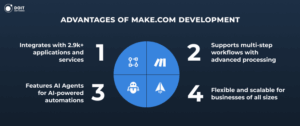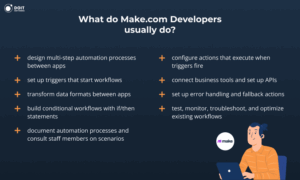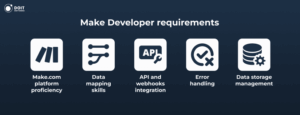Make.com is a leading visual platform for building and automating workflows with minimal or no code. Now, it enables over 350k organizations to integrate apps and services, creating a centralized hub for their operations.
In this article, you’ll learn how to create a comprehensive Make developer job description. We’ll cover the specific roles a Make expert can fill, their day-to-day responsibilities, and the key skills you should look for.
If you’re looking to hire a Make specialist, feel free to use the customizable Make.com expert job description template below. Or, skip the hiring process and let DOIT Software connect you with a vetted Make developer in a few days.
A Make.com developer is an automation specialist who uses the Make platform to design, build, and manage workflows. Unlike a traditional software developer who writes code, a Make expert connects different applications using a visual builder. Here, they integrate marketing tools, LLMs, databases, and other systems to exchange data and trigger automated actions.

A professional with Make.com skills can hold several titles, including:
A Make developer handles the entire lifecycle of an automation project on the platform. They start by analyzing your current processes to identify bottlenecks and opportunities for automation. Then, they design and build workflows, referred to as “scenarios” in Make, to connect your apps and automate tasks.

Their responsibilities also extend to continuous monitoring and troubleshooting. Make experts dedicate significant time to optimizing existing scenarios or adding new integrations when your tech stack changes.
Here is a full list of responsibilities typical for a Make developer job description:
Now let’s take a closer look at the qualifications you should seek. An effective Make developer combines logical thinking, business process understanding, and technical skills.

They have a strong, practical understanding of the Make.com platform, including its core components like modules, routers, iterators, and aggregators.
Another critical skill for any Make developer is a solid grasp of how apps communicate over the web. They should understand API concepts, be familiar with different data formats, and be comfortable setting up webhooks. This knowledge allows them to integrate almost any online service, even those without a pre-built connector in Make.
At the same time, they need a problem-solving mindset and strong communication skills to analyze a company’s processes and develop a reliable automation to handle them.
Now, let’s sum up the key skills for a Make developer job description:
For a more detailed look at relevant Make developer skills, please read our dedicated article.
Here is a comprehensive Make.com automation specialist job description template to help you get started. You can customize it to match your company’s specific needs and required tech stack. Just fill in the bracketed information and adjust the responsibilities and requirements as needed.
Job title: Make.com Developer / Automation Specialist
Location: {{ Remote / City, State }}
Employment: {{ Contract (Project-based) / Full-time / Part-time }}
{{ Company name }} is seeking a skilled Make.com Developer to join our team and help optimize {{ industry/department }} tasks through intelligent automation. As our Make expert, you will be responsible for building and improving the automated workflows that connect our business systems and help us cut manual tasks.
In this role, you’ll be responsible for:
▪ Collaborate with {{ department / roles }} to understand requirements and identify automation opportunities.
▪ Develop and maintain automation scenarios using the Make.com platform.
▪ Integrate SaaS applications using the available Make built-in modules and APIs.
▪ Troubleshoot and debug issues when needed.
▪ Provide recommendations to optimize existing automations for performance and scalability.
▪ Document all automation processes for team reference and future development.
Requirements:
▪ Proven experience as a Make.com developer or in a similar automation role.
▪ In-depth knowledge of the Make.com platform and its capabilities.
▪ Strong understanding of APIs and webhooks, ability to read API documentation.
▪ Commercial experience creating Make.com scenarios for {{ your industry/department }}.
▪ Proficiency with {{ list your tech stack, e.g, SaaS applications, services, tools, and LLMs }}.
▪ Familiarity with database concepts and JSON data structures.
▪ Excellent problem-solving and analytical skills.
▪ Ability to work independently.
▪ A degree/background in Computer Science, Engineering, Business, or a related field.
Nice to haves:
▪ Experience with other automation platforms, such as Zapier or n8n.
▪ Prior experience as a software developer.
▪ Understanding of JavaScript (Node.js) for custom functions.
▪ Experience with AI integration via LLM models and basic prompt engineering.
▪ Make.com or other relevant certifications.
What we offer:
{{ List any specific benefits your company offers, e.g., health insurance, learning budget. }}
How to apply:
{{ Provide instructions on how to apply, e.g., “Please send your resume and a portfolio of built scenarios with Make.com to careers@yourcompany.com.” }}
Finding the right Make developer fit can be a challenge. Beyond writing a clear Make developer job description, you must also assess candidates for their platform proficiency, integration experience, and analytical thinking.
If you need to streamline your hiring, DOIT Software can help. Our talent pool comprises top global Make.com developers, carefully screened for both soft and technical skills, as well as relevant industry experience. The DOIT team can also help you with onboarding, payroll, HR, legal, and admin tasks post-hire.
Get a consultation and start building your dream team ASAP.
Request CVsGlobal businesses use Make to connect applications and automate repetitive tasks between them. The most popular automation cases are lead management, invoicing, email marketing, content creation, and contracting.
While a Make developer may not write code in traditional programming languages, they are absolutely a type of developer. They design complex systems using a visual interface that still requires a deep understanding of APIs, data structures, and workflow logic. In fact, a Make.com developer job description often includes using JavaScript to write custom functions.
Both Make and Zapier are leading automation platforms, but they have different strengths. Zapier is known for its user-friendliness and linear, step-by-step automations (“Zaps”). Make, in turn, offers a more flexible canvas that allows for multi-path scenarios with advanced logic. To find out more, you can also read our article comparing Make, Zapier, and n8n.
A Make developer can work on a wide variety of projects across business functions. The most popular projects include AI-powered automations and integrations with marketing toolkits. Additionally, they can automate sales workflows, customer support, e-commerce operations, HR processes, and reporting.
Another type of project is custom integrations, where Make developers connect niche SaaS tools or internal systems not covered by existing connectors by developing Custom Apps.










